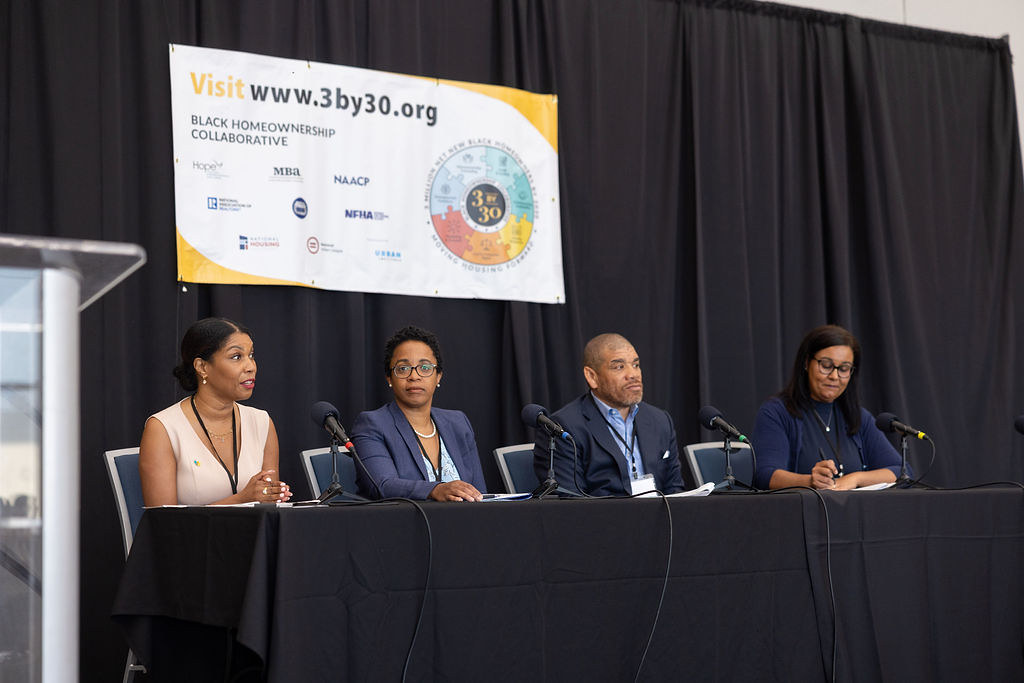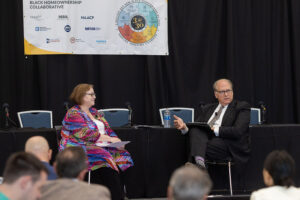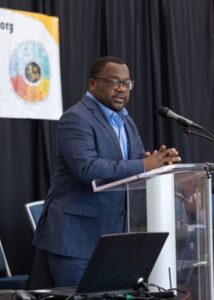
In keeping with its historical founding on Juneteeth 2021, the Black Homeownership Collaborative, a coalition of more than 100 organizations and individuals, gathered national and local housing advocates on June 18 at the Armour J. Blackburn University Center on the campus of the historic Howard University to recognize the third-year anniversary of its 3by30initiative and to discuss strategies to increase Black homeownership across the country. The Collaborative, led by a steering committee of executives from Hope Enterprise Corporation, the Mortgage Bankers Association, NAACP, National Association of REALTORS®, National Association of Real Estate Brokers, National Fair Housing Alliance, National Housing Conference, and the National Urban League, with research by the Urban Institute, is committed to creating 3 million net new Black homeowners by the end of 2030.
The event examined the role cities like Washington, DC can play in advancing Black homeownership and focused on intentional strategies and solutions to address the pressing issues surrounding the racial wealth gap and disparities in homeownership in the United States.
During a fireside chat with NHC’s President and CEO David M. Dworkin, U.S. Department of Housing and Urban Development Assistant Secretary for Housing and Federal Housing Commissioner Julia Gordon discussed the actions HUD is taking to remove barriers to homeownership for individuals and families of color. “At FHA, we are working to address the systemic barriers to homeownership that Black homebuyers face,” said Commissioner Gordon. “The 3×30 initiative and the conversations being had today are crucial to closing the homeownership gap and expanding the wealth-building potential of homeownership to more Black families.”

At the opening session, Bryan Greene, co-chair of the Black Homeownership Collaborative and Vice President of Policy Advocacy at the National Association of REALTORS® discussed how the disparity in Black homeownership rates underscores a historical and systemic inequity that demands urgent attention. He highlighted how the 3by30 initiative includes concrete, achievable, and quantifiable measures to reduce this disparity and enable homeownership for millions who were previously excluded.
Throughout the morning, attendees listened to panelists discuss local and regional strategies to address the Black homeownership gap. In the “DC’s Blueprint for Bridging The Gap” panel, speakers discussed initiatives and strategies aimed at creating pathways to equitable housing in the District of Columbia. Moderated by Sasha-Gaye Angus of MANNA Homes, panelists included Lisa Williams of Homes by CFE; Harvey Yancey of H2 Design Build; and Director Colleen Green of the DC Department of Housing and Community Development. Another panel, titled “Pathways To Home: Regional Strategies For Black Homeownership,” featuring Kiyadh Burt, HOPE Policy Institute; Marty Kooistra, Civic Commons, Black Home Initiative; Tawkiyah Jordan, Habitat for Humanity International; and Wendy Penn, Mortgage Bankers Association, focused on regional initiatives from across the country to narrow the Black homeownership gap.
The afternoon panels focused on national strategies and issues such as “The Future of Buyer Representation in the Home Buying Process,” featuring a lively and engaging discussion on the history of consumer lawsuits, potential negative impacts on first-time homebuyers, and the next steps for the real estate industry. Moderated by NHC’s David Dworkin, panelists included Steve Brobeck, Consumer Federation of America; Sara Rodriguez, NAHREP and the Hispanic Wealth Project; and Mosi Gatling, New American Funding. During the “Advocating for Equitable Housing Policies to Protect Civil Rights” panel, Bryan Greene, NAR; Barry Wides, Office of the Comptroller of the Currency; Ken Scott, Relman Colfax; and Lisa Rice, National Fair Housing Alliance, discussed recent efforts and initiatives, such as Special Purpose Credit Programs, to address equity in homeownership and the challenges that aim to minimize and delay progress.

The final panel, “Rooted in Wealth: Safeguarding Black Homeownership and Land Legacy,” explored emerging topics such as heirs’ property issues, property tax disparities, and rising homeowners’ insurance costs. Participating in this panel was Natasha Moodie, Housing Assistance Council; Nketia “Ink” Berko, National Consumer Law Center; Andrew Kahrl, University of Virginia and author of “The Black Tax;” and Kevin Cameron, American Land Title Association.
In addition to engaging in panel discussions, the program included two interactive exhibits by Fannie Mae and Habitat for Humanity for attendees. Fannie Mae’s “Consumer Housing Journey” is an evidence-based, consumer-centric framework for understanding housing barriers at each stage of a consumer’s life, particularly Black and Latino consumers. Attendees, guided by Fannie Mae Mission Ambassadors, learned more about the research that underpins the Consumer Housing Journey as well as housing and financial resources developed to help remove barriers to equitable and sustainable housing. Habitat for Humanity’s “Black Homeownership Matters” exhibit is an interactive art installation that tells the story of housing discrimination in the United States and describes the need for collective action to reduce racial inequities in the housing sector.
To watch a recording of the event, please click here. To learn more about the Black Homeownership Collaborative’s 3by30 initiative, please visit www.3by30.org and contact Charles Lowery, Senior Policy Director at NHC at charles.lowery@nhc.org and 202-909-5391.

